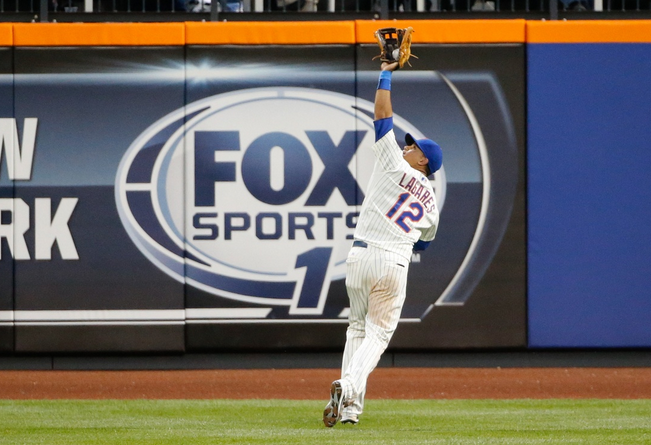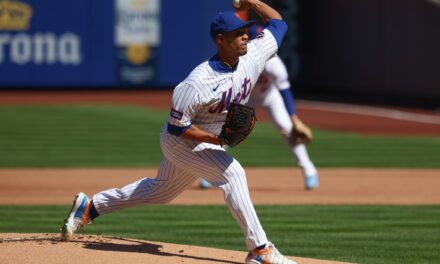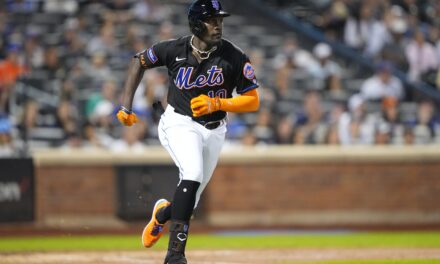
Plenty has been said about who the Mets should have lead-off in their 2014 batting order. It seems like Eric Young, Jr. is the leading candidate, with his candidacy coming at the possible expense of defensive extraordinaire Juan Lagares. Mets fans have voiced their frustration about this on Twitter. It is time to take a look at how the Mets may be overstating the importance of a lead-off hitter in context of the defense it may cost in juggling the lineup to accommodate one.
For this analysis, we will make some basic assumptions. We are going to compare Eric Young, Jr. as a lead-off hitter versus Juan Lagares as a defensive guru in terms of runs. We will assume that everything that the two players do is equal other than on-base-percentage and defense. This way we can isolate the effects of each player’s role on the overall team.
Beginning with on-base-percentage, it is only common sense to understand that lead-off hitters are expected to get on base. They set the table. They get things going. Whatever cliche you want to use. The more times a lead-off hitter gets on base, the more opportunity the hitters behind him have a chance to drive in runs. Of course, there are other factors synonymous with a lead-off hitter – patient hitters, contact hitters, speed players – but each title coincides with the central theme that it is the player who bat’s first role to get on base, and then in position to score runs.
Last season, Shin-Soo Choo got on base more than any other player out of the first batting position. His .432 OBP was thirty-four points higher than the next closest player, Matt Carpenter. Eric Young had the second lowest on-base-percentage of qualified (at least 350 PAs) lead-off hitters last season with a .318 rate. That means out of 100 plate appearances, Choo was able to get on base nearly twelve extra times than Young.
Of course, getting on base doesn’t guarantee a run. Someone has to drive you home. Using the league average runs scored percentage, which measure the percentage of times a baserunner scores once reaching base, of 29%, for the 11.4 extra times per 100 plate appearances that Choo got on base last season, he would have scored roughly 3.3 extra runs than Young. Multiply that over 500 plate appearances, and the difference between a Shin-Soo Choo OBP in the lead-off role versus Eric Young, Jr.’s equates into 16.5 extra runs scored.
That brings us to the defensive guru. Juan Lagares ranked 6th in baseball for the highest number of defensive runs saved (DRS) for any positional player with at least 800 innings in the field last season. What does that mean?
Until MLB Advanced Media releases their cutting edge data on defensive value to find a true indication, DRS from The Fielding Bible is one of the best metrics available to measure a player’s contributions from defense. It uses Baseball Info Solutions to calculate the results, meaning it is based on human scorers. To save on the long explanation (those interested can find more detail here), DRS rates players based on their ability to field plays above or below league average. There are several factors considered – including the player’s arm and glove – that make up a total value that equates into how many runs a player saved or hurt his team in the field compared to league average.
Juan Lagares saved 26 runs last season as the Mets center fielder. In comparison, Eric Young, with only 8% less innings, saved only 3 runs in the field. A 23 run difference. That means the difference between Juan Lagares in the field and Eric Young is greater in terms of runs saved than the difference between Eric Young and the league’s best lead-off hitter, Shin-Soo Choo, in terms of added runs scored. With Choo’s OBP, and assuming a league-average RS% of 29%, Young would have scored an extra 16.5 runs last season. But the Mets would have lost an extra 23 runs saved if they had played Young in the field instead of Juan Lagares. The Mets are 6.5 runs better playing Lagares rather than Young, even if Young got on-base as much as the league’s most efficient lead-off hitter.
Perhaps, the Mets should reconsider their position on the importance of a lead-off hitter versus extraordinary defense.















